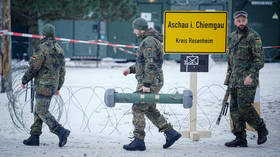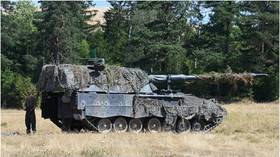
The figure has increased almost fivefold since the Ukraine conflict began, a news agency reports, citing officials

FILE PHOTO: Bundeswehr soldiers on a training mission in Lest, Slovakia, 2022. © Kay Nietfeld /Picture Alliance / Getty Images
The number of Germans rejecting military service has nearly quintupled since the start of the conflict in Ukraine, RND news agency reported on Friday, citing figures provided by the Federal Office of Family and Civil Affairs (BAFzA).
“In 2021, the Federal Office of Family and Civil Affairs received 201 applications for exemption from military service, and in 2022 there were 951 such applications,” a BAFzA spokesman said.
The Defense Ministry provided slightly different numbers to RND, saying that last year’s applications came from 223 active-duty soldiers, 266 reservists, and 593 people who had not served in the military.
The ministry noted that not only active-duty soldiers are eligible to become conscientious objectors.
According to RND, many explained their applications by saying they did not expect the Ukraine conflict to occur.

Read more
Conscientious objectors still make up a small fraction of the roughly 183,000 people currently serving in the German Armed Forces (the Bundeswehr). But the rise in those refusing to serve is considered a growing problem, given that Germany suspended compulsory military service in 2011 and is now planning to boost its defensive capabilities.
The Bundeswehr’s personnel management office told RND that “the actual number of applicants for military service has been declining since the beginning of 2022.”
In 2018, Berlin announced plans to increase the number of troops to 203,000 over the course of seven years. After Russia launched its military operation in Ukraine in late February, Germany has been supplying Kiev with heavy weapons, including armored vehicles and self-propelled howitzers.
However, Berlin’s rush to aid Ukraine has also revealed several problems within the Bundeswehr, such as ammunition shortages and cases of faulty equipment. German media reported last month that the country was struggling to meet its commitments under NATO due to not having enough of certain types of weapons and munitions in stock.




